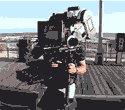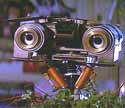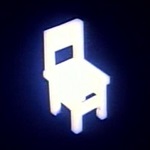|
mechaforce posted:Yes and no - - my main point was that you don't need to drop 60k to shoot in ultra low light and keep it looking good. The noise removal plugin we used actually retains 99% of the data since it uses sampling. See, this is plain wrong. There's people putting up numbers, comparison tests and specs on everything and thinking that's what defines the quality of their work. You seem to forget that even the most beautiful and technically perfect shot is worthless dreck without being part of a good movie, which in turn depends on shots that work, not shots that are technically perfect. It seems a lot of young cameramen who call themselves DoP seem to be working for their reel instead of the project they signed up for. So they are more interested in shooting with the nicest equipment, and a lot of technical dickwaving ensues. No real DP should give a poo poo about camera specs beyond the point where the question "Is this the most suitable for the film?" is answered. The whole film vs. video thing has turned into video vs. video but it's still just as ridiculous an argument. Tiresias posted:You seem to qualify "quality" in terms of highest quality, but not highest quality as dictated by the story. Lower resolution, digital filmmaking very much so has it's place in the "visual medium". This is exactly what I mean. There's a book about Robby Müller where he talks extensively about putting himself at the service of the story. The interview was conducted by Wim Wenders. Müller is one of the people that are very hard to define in terms of visual style, because for every movie he does what is needed, not what his ego wants. I don't know if this book was released in English speaking countries, but if you can get your hands on it, it is a very interesting read and a lot of the spec-waving people would do good to seek it out. Frost fucked around with this message at 23:01 on Apr 16, 2010 |
|
|
|

|
| # ? May 17, 2024 01:56 |
|
Frost posted:
This holds true for directors as well. I generally do not trust drama directors to do doc or edutainment programming. Too often they are fixated on their independent feature. You can't ever meet with them, without hearing about their script for something other than what you are working on. They are out for their feature, or the reel that will help them with their feature. I love that term being "at the service of the story" I'm going to start using it a lot.
|
|
|
|
Tiresias posted:You mean, you don't think anybody could make a low light / candlelight shot look decent on an DVX or XL1? I should have clarified. That statement came out of using gain to shoot outdoors at night before I knew anything or could get any help with lighting. The amount of noise/graininess you get on the DVX is an adequate punishment for being a scrub who don't know how to light good.
|
|
|
|
Tatrakrad posted:I should have clarified. That statement came out of using gain to shoot outdoors at night before I knew anything or could get any help with lighting. The amount of noise/graininess you get on the DVX is an adequate punishment for being a scrub who don't know how to light good. Well, that's why you experiment. I love doing test shoots, especially before going into a job. People throw around the phrase "well, can't you push the gain in camera?" without understanding what that means, even DPs. Some DPs probably still love the look of video noise. However, people who find it distracting to the visual language of the film (lighting, contrast, natural versus unnatural, framing choices, camera movement) tend to hate it. I think I'm one of those people.
|
|
|
|
Tiresias posted:Some DPs probably still love the look of video noise. Sometimes it's the director. Dion Beebe does great work, except when Michael Mann demands he shoots with a 24fps shutter and the grain pumped up.
|
|
|
|
Dr. Fishopolis posted:Sometimes it's the director. Dion Beebe does great work, except when Michael Mann demands he shoots with a 24fps shutter and the grain pumped up. I think Michael Mann didn't necessarily make that demand. Moreso, from what I hear about how he works, he just demanded they stop wasting time and just shoot. DP had no time to light, so he probably instructed the camera ops to push the gain up so they'd at least have an exposure. Many of the shots looked great in "Public Enemies", but some looked absolutely poo poo.
|
|
|
|
mechaforce posted:Yes and no - - my main point was that you don't need to drop 60k to shoot in ultra low light and keep it looking good. The noise removal plugin we used actually retains 99% of the data since it uses sampling. quote:You're right, they should've shot Blade Runner on Hi8 - would've saved em millions too! I'll be the first to acknowledge that this technology is pretty drat cool, and that the quality you can get out of an incredibly cheap camera has never been higher. But I'm not trying to make a point about image quality or about technology. What I'm saying is that you need to take ownership of your work. If you credit your shots to Sony or to RED or whomever, what does that say about you, other than that you're a disposable person who knows how to press the buttons on a miracle machine and point it in the right direction until it yields the desired results? You're going to have a job precisely until some new technology comes out that some other kid knows how to press buttons on, and then that's the end of your career as a professional storyteller. Visual Effects artists have been making this exact mistake for the past 20 years. "Look at what I made using [computer] and [software]!" gets understood by producers, studios, and the general public as "look at what [computer] and [software] can do! oh, and I pressed the buttons until it happened" Now we're paying the price, because no one understands the importance of humans in the process. Everyone thinks that fancy computers do all of the work, and no one knows the vast amounts of knowledge, experience, critical thinking, and brute force labor that must be applied to wrangle a professional-looking result out of even the best technology. This hurts our reputations, it hurts our pay, and it hurts our status in the industry. And that's what's going to happen to professional Cinematographers if you are as careless as we were. Claim authorship over your work. Claim it during all stages of production, and claim it when you show it to anyone else. If your image was authored by a Sony EX-1 and Neat Video, then what did you do, other than light candles, point the camera and hit record, and throw on some filters in After Effects? The world is full of people who would love to diminish your work. Don't pre-empt them by doing it yourself. [again, not a criticism of you, or anyone in particular, this is just a trend I notice A LOT and it drives me up the wall because I think you're all hurting yourselves without knowing it]
|
|
|
|
Tiresias posted:I think Michael Mann didn't necessarily make that demand. Moreso, from what I hear about how he works, he just demanded they stop wasting time and just shoot. DP had no time to light, so he probably instructed the camera ops to push the gain up so they'd at least have an exposure. Many of the shots looked great in "Public Enemies", but some looked absolutely poo poo. Beebe didn't shoot Public Enemies. Mann's been using that technique since Collateral, I'm pretty sure he's doing it on purpose. Public Enemies was a multi kazillion dollar movie, he could have gotten any look he wanted.
|
|
|
|
Video noise has its place. Proper use of it can add a lot to a look, I did a short film for a 24 hour competition where I had the DP put on about 3db of gain while we were shooting outside in the middle of the day, while we were already getting a proper exposure. The result was the video looking slightly "textured," to the point where, after the competition, some people who were shooting indie features down on the big Sony HD F-series cams were asking us how we shot & delivered 16mm in 24 hours. But that was a specific shot I wanted, a style that I wanted, that I'd done a fair bit of research on before I made the suggestion. We tried a bunch of things to get a specific look on those shots, from pre-programmed scene settings to stopping down an extra ND stop, opening the lens all the way and shooting everything at full zoom for the smallest DoF. I think it's great to approach a shot with the idea of, "How can I make this thing look as cool as possible," but that should be balanced out over the entire script, as you take a step back and think about your approach, not just to one shot, but every single shot in the film, and how you can maintain a "look" all the way through. It's very cerebral and requires thinking a lot more about the big picture than just thinking about "this one scene is really cool and I think we could do some really cool stuff for it," because that sort of thinking will get you one really good shot and a bunch of mediocre shots. Then, of course, there's also the, "Is this camera's feature or ability going to add to the story, or subtract from it?" because then you've got a whole 'nother problem. If you're shooting outside, at night, using gain, and video noise is NOT part of your story, then you've failed. But for a movie like "Paranormal" or whatever it is, the cheesy effects are part of the story, so it's forgiven. Most of the time, the camera is a silent observer, the audience SHOULD just be thinking about what's displayed on the screen. If you notice the camera, and that's not the intention of the shot, then that's a pretty big failure.
|
|
|
|
Dr. Fishopolis posted:Beebe didn't shoot Public Enemies. Didn't mean to imply Beebe shot "Public Enemies". I know he shot "Collateral" and "Miami Vice" for Michael Mann, and one could argue that the HD video look in "Collateral" served the story just fine. "Miami Vice", not so much. Yes, "Public Enemies" was a high budget film, but here's a story I heard from one of the cameramen on Miami Vice: First week of shooting, big night interior of a huge club in Miami. They've got a couple hundred extras dressed for the club, the whole place lit up, streets out front shut down. Somewhere around the end of day 3, Michael Mann decides he hasn't liked Colin Farrell's facial hair (the handlebar mustache wasn't quite right) since day 1. Colin Farrell gets his facial hair adjusted, and they have to reshoot all of Colin's work over the last 3 days. Another story, although this was a "down the grapevine" story: the scene near the beginning when Jamie Foxx and Colin Farrell are on the roof of a building looking at downtown Miami? Originally, that was scripted to take place somewhere else. Last minute, Michael says they "found" (read: he planned to shoot at but didn't tell anyone) another location... the roof. Dion hadn't gone up there, had no way to light it, and nobody tells Michael Mann to wait. So, they pushed the gain and shot. These are not isolated incidents. Working in the industry, you hear lots of great "Michael Mann" stories. After the performance of "Miami Vice" and "Public Enemies" at the box office and home video, I think Michael Mann's "kazillion dollar movies" days are almost over. I'm all for happy accidents, for "finding something great in the moment", all the little nuances that make filmmaking exciting AND enhance the final product. However, that still requires you give your skilled, talented technicians a chance to do the jobs they're paid for, and which they take great pride in doing. End of the credits, that's still their name on the film. I doubt Dion Beebe's career has suffered any due to shooting "Miami Vice", but anyone who sees that movie and looks at his body of work ("Chicago" Oscar nom for cinematography, "Memoirs of a Geisha" Oscar winner for cinematography) knows something went wrong.
|
|
|
|
mechaforce posted:Yes and no - - my main point was that you don't need to drop 60k to shoot in ultra low light and keep it looking good. The noise removal plugin we used actually retains 99% of the data since it uses sampling. For $60k, I could light a huge night exterior that spanned 2-3 city blocks for one night, maybe two, with a variety of methods. If your back was against a wall with production, sure you can "get the shot" through your method. However, DP's should have MANY tricks in their bag for how to achieve a shot, and the last one offered should be "I'll fix it in camera".
|
|
|
|
don't waste your time Tiresias, idiots will continue to make terrible poo poo and defend it to the death while not understanding why it's terrible. Then they'll stop working, and be remembered as technicians instead of artists, and hopefully die alone and forgotten. Yes they are killing our industry but techs are worth nothing anyway, it's the creatives that have lasting careers. Remember kids! crush the blacks! shoot 4k! use gain, light with kinos, edge light women, back light the men, output to 1080p, output to H264, upload to vimeo, watched once and forgotten P.S. gently caress anyone who calls themselves a cinematographer without exposing a negative, you're a Videographer, jerkwads. Edit: here is something legit, read the article in AC mag for this month about the Production Summit. The big problem with a lot of visual people today is they forget how to see things. To many creatives these days the creative process with finding something they've seen they could practically just cut together what they are being inspired by to make the same product! I find one of my biggest influences is just when I see something that catches my eye, I look at it and think of what I find compelling about it and how I could create that. Stop trying to create "looks" and start creating emotions, idiots. Stop defending your terrible work and stop smelling everyone elses' farts. Too many fanboys, all I want my camera to do is do what I want it to. Mozzie fucked around with this message at 06:14 on Apr 18, 2010 |
|
|
|
My steady paycheck would take issue with your derision of the term videographer. I understand that you're passionate about your field but aren't we being a bit overly critical?
|
|
|
|
Mozzie posted:stuff You sound like a PA
|
|
|
|
The Affair posted:My steady paycheck would take issue with your derision of the term videographer. A LOT of criticism is pretty necessary in this field. Not only do I do a lot of videography for other people, but I also make a living as an editor, and there's a lot of times that I get footage from people that I have to cut, and it's footage from people who call themselves DPs and have NO IDEA how to shoot for an editor. This is something that comes from years of experience, but also working in teams where you get that feedback from the editor when he screams down your neck about giving him more time on cutaways, and not cutting in the middle of a performance and then recording again a few seconds later. Technology allows a lot of people to be jacks of all trades (and I will admit I am guilty of it myself, in this industry you have to be able to adapt to make a living), but when you start with that attitude and keep going from it, peoplefail to learn the foundational principles of good videography, a lot of which extends to filmmaking in general. I've got a buddy who does rap videos with that new Canon, and he's makin some money and doin alright, but when he talks about things like "Why do I need to bother renting lights? I don't want to have to try to work out a schedule for this," and that to me is a HUGE attitude problem. People SHOULD be planning their shoots out in advance, and technology makes it so that, while you don't *have* to, if you don't, you won't develop those good habits of successful filmmakers. You have to develop good habits at every stage, and the fact that people can go out and do everything on their own without pre-planning anything is really changing the system. I don't mind the influx of new ideas, but the fact is that the way that people had to do things before FORCED those sorts of good habits. A cinematographer who's shooting 35 isn't going to just grab a camera, run out and start shooting, they're going to finalise the script, make sure their actors are solid, rent the location, have all the lights, that cinematographer is going to KNOW the shot is perfect because there's no going back. I'm glad we don't have that uncertainty with video, but I'm sad that planning has fallen by the wayside. How can you pitch a video idea to a musician if your reel and your idea stream is based on, "Well let's go find a location, stick you in it and shoot"? How are you going to plan out a big 3-day shoot with lights and crew if everything you're familiar with is just you and your camera and final cut when you get home? How will you effectively work with other team members on larger shoots if you have no experience working with crews? Hell, I remember DPing a TV show pilot, we had four cameras, including one on a crane. I never touched a camera for that shoot, I sat at a big table with a bunch of screens and set of headphones where I would tell each of the camerapeeps what to get and what angle to get it from. That's more of your traditional DP work, but it was hell hiring a crew because I had a bunch of really experienced, competent cameramen that I'd worked with in teams that I put on the cams themselves, and a bunch of good, hard-working guys as ACs that would ask me why I went with the other guys over them, and it was about the group experience. We're shooting live, I can't have one camera getting in another camera's shot, or two guys trying to get the same angle, I need people who know exactly how to fulfill a role in a group, and when I hire folks who are used to cowboying their way through videographer land, I can't trust them to handle certain things. There's so much more involved than just composing a shot and hitting record. Criticism is pretty necessary not just for improving those fundamental skills, but all the other habits and skills you need to be successful in the big picture.
|
|
|
|
Mozzie posted:P.S. gently caress anyone who calls themselves a cinematographer without exposing a negative, you're a Videographer, jerkwads. People get way too obsessive about gear and medium and forget to tell a story with images because of it. Unfortunately it has been my experience that it's mostly film students, or people just out of film school, who do this. The tools are important, for sure, but if you get a chubby thinking about a camera then you may need to rethink why you wanted to do this job in the first place. At NAB last week we had a revolutionary new way to move the camera with a Steadicam (called the Tango if you're interested), many experienced and famous DPs and directors who came by instantly saw the potential and asked for little demos of their ideas, this was wonderful as they saw the potential of this new tool. Most film students, however, only wanted to know about the canon 5D, or the SI2K, and the transmitter that we used on the rig to get an image. Some very dumb questions were asked that had no relation to what we were trying to show. If you get the rare opportunity to pick the brain of a man like Garrett Brown, you do not ask him about the maximum ISO setting on a 5D! I get that they may have been interested in the camera but that's the sort of stuff you use google and a manual for, not the inventor of the Steadicam, and the man who shot Rocky and The Shining, at a busy tradeshow. This was really disappointing to me but kind of shows what I'm talking about. So let's get out of these pointless discussions and back to talking about how to use these wonderful tools to create incredible shots. That's the whole point of the job!
|
|
|
|
Steadiman posted:I find this a horribly narrow-minded statement. Cinematography should not be about the medium or equipment, those are tools. A good cinematographer is someone who has the eyes and ability to create evocative and wonderful imagery with whatever tools are available to him. Be it a full 35mm kit, with more lights than Vegas, at his disposal, or some crappy DV camera and some building lights, if they can make it look good then they are cinematographers. When I'm watching a movie I don't want to think about the camera they used or what lighting kit they had available. I just want it to look awesome. I'm looking at this thing and I'm impressed. Its a wearable Jib/boom with automated controls. Anything that lets you move a camera to new and interesting angles is awesome in my book. Doesn't look like they have spec sheet for weight limits though, will be interesting to see.
|
|
|
|
Laser Vampire posted:I'm looking at this thing and I'm impressed. Its a wearable Jib/boom with automated controls. Anything that lets you move a camera to new and interesting angles is awesome in my book. There are some videos of our demos on YouTube too if you want to see it move.
|
|
|
|
You met Garrett Brown? Also: what exactly does a polarizing lens do?
|
|
|
|
Magic Hate Ball posted:You met Garrett Brown? I remember seeing footage a while back that was from his first stabilizer, with his girlfriend running up the steps of the Philadelphia library, a la the "Rocky" shot. I believe she's running down the steps, and then running back up again. As for your question: http://en.wikipedia.org/wiki/Polarizer Simply: a common polarizer as used in filmmaking is an "absorptive polarizer" (I'm not this smart, just using the wikipedia). Any light that is reflected or glared off something in the shot is absorbed by the polarizer, never passing through the filter.
|
|
|
|
Tiresias posted:I remember seeing footage a while back that was from his first stabilizer, with his girlfriend running up the steps of the Philadelphia library, a la the "Rocky" shot. I believe she's running down the steps, and then running back up again. In fact, if you get the 25th anniversary DVD for Rocky there is a miniature documentary with Garrett on steadicam and that sequence in particular. This includes him going back to the famous steps. There's also a commentary track with Garrett on the DVD. Very interesting stuff if you're at all into filmmaking and very much worth the purchase. Steadiman fucked around with this message at 01:10 on Apr 21, 2010 |
|
|
|
Steadiman posted:In fact, if you get the 25th anniversary DVD for Rocky there is a miniature documentary with Garrett on steadicam and that sequence in particular. This includes him going back to the famous steps. There's also a commentary track with Garrett on the DVD. Very interesting stuff if you're at all into filmmaking and very much worth the purchase. Personally, I loved seeing Garrett and the stabilizer in numerous wide shots of the boxing ring during the fight at the end. Just look for the glowing green screen, especially easy if you get the bluray. That's interesting to hear about the final shot they used in the movie. I always wondered if they were some external factors causing the horizon issues in the movie. Lots of head chopping, etc.
|
|
|
|
Brown's commentary for The Shining is also excellent.
|
|
|
|
Interesting video of previs for 3d shoot. Annotations list their concerns about certain shots. http://www.youtube.com/watch?v=BosQR3jMRY0 We're getting the new Panasonic 3d camera in a couple of weeks and we've never shot 3d before so we're trying to learn as much as possible as fast as possible. I don't think shooting 3d is terribly easy.
|
|
|
|
Walnut Crunch posted:Interesting video of previs for 3d shoot. Annotations list their concerns about certain shots. It's awesome that you're getting to play with that stuff though. People experienced with 3D are already in hot demand, and there isn't even a consumer format yet. It'll be a great thing to have on your resume.
|
|
|
|
Walnut Crunch posted:Interesting video of previs for 3d shoot. Annotations list their concerns about certain shots. I was able to cross my eyes enough to watch this in 3D, very cool stuff.
|
|
|
|
Walnut Crunch posted:Interesting video of previs for 3d shoot. Annotations list their concerns about certain shots.
|
|
|
|
Walnut Crunch posted:You sound like a PA The film world is perpetually bitter against technology that reduces the amount of work or crew that is needed to make a movie. This is not the first time I have experienced this type of reaction. Just wait until I start talking about camera stabilization software  Walnut Crunch posted:Interesting video of previs for 3d shoot. Annotations list their concerns about certain shots. Those annotations!! ouch!!! I've been working on stereoscopic vfx for a couple shoots I've been on, and you just need to treat the frame as a window... Having things come towards you from the screen plane needs to be done cautiously, since it's harder for the eyes to adjust to it. And I'm not sure if the panasonic shoots parallel or coverged, but just make sure that you keep in mind what you want the audience to focus on (people or objects shouldn't be split too much). Just a couple thoughts. edit: yeah, what he said ^^^ Not being able to change the inter ocular/axial kinda sucks though... kinda limits what scale you can work at. So much for those mountain vistas! mechaforce fucked around with this message at 09:40 on Apr 22, 2010 |
|
|
|
mechaforce posted:The film world is perpetually bitter against technology that reduces the amount of work or crew that is needed to make a movie. This is not the first time I have experienced this type of reaction. You reveal quite a bit when you refer to "the film world" as if it's a world with which you're completely unfamiliar. You know why the "film world" is perpetually bitter against technology? Every time it happens, the rates fall out of bed on EVERYONE in that department. Happened when 16mm was first introduced, happened again in the late 90's with the onset of indie filmmaking, and it's happening once again. I love technology. I just shot a feature entirely on the RED with minimal crew on a microbudget. I also did it taking a rate that was barely above minimum wage. If I had a wife, kids and a mortgage, that rate probably couldn't have worked. Were the electricians furious when the film world moved from carbon arcs to HMI's and newer, big lights? 2/3 men needed to operate a light all day, whereas now one man could reasonably hustle 2 lights around? Probably, and productions probably tried trimming their electric crews. However, they probably realized the money they saved on wages they lost on overtime when they realized a crew of 6 electricians wrap a set 25% slower than an 8 man crew... and everything bottlenecks at the truck no matter what! Camera department fires a loader, but hires a data manager, and then also hires a digital imaging technician. Sometimes they're the same, but not always. The claim that film crews are full of technology hostile luddites is disproven by the number of iPhones/Droids/iPads on set at ANY time. We're not opposed to new technology in any way, because most older guys will tell you they've seen this "revolution" before. It comes, it goes, producers then realize they should have paid their crews well the whole time. The people who suffer from the technology "revolution" are the crews while they watch their rates bottom out, and they have to weather the storm.
|
|
|
|
I'm very familiar with the film world. While I'm sure that I may not be as experienced as people like yourself, my experiences so far have informed my decisions. A recent project that I directed had a crew of about 25 professionals. I wasn't implying that those in the industry are cavemen by any means... I'm sure you understand. As even you have admitted, there is a resistance to evolving tech that lowers crew size. It is a job market, but it's also a creative one - it exists only to produce content. You can't complain about a changing industry, just as you can't blame digidesign for releasing hardware that lets people record music on their laptops. But from the perspective I'm coming from, it all works great. Since I shoot a lot of action, and like to utilize urb-ex and remote locations, it's absolutely necessary to have a tight crew. Get it, get out. All the tools we use help us stay mobile while getting the most professional image we can. The best anyone can do, and even myself, is to stay on top of new tech that's coming out... or create the content that you want to see. mechaforce fucked around with this message at 03:02 on Apr 23, 2010 |
|
|
|
Tiresias posted:I love technology. I just shot a feature entirely on the RED with minimal crew on a microbudget. I also did it taking a rate that was barely above minimum wage. If I had a wife, kids and a mortgage, that rate probably couldn't have worked. I understand the aversion to adapting new technologies for the legitimate fear that jobs will be wiped out or wages lowered, but this problem is persistent throughout the entire workforce, perhaps not to the same degree but persistent nonetheless. I don't really agree that things will get better, but you've got inside knowledge and experience that a lot of us don't have. I'd like to think with the advent of Youtube and similar video sites that monetizing your film or video might actually get easier, but obviously there are drawbacks - less emphasis on producing an expensive feature-length piece and more towards shorter, cheaper, Youtube-digestible bits. I feel like things have been trending that way for a long time.
|
|
|
|
What I find really depressing about the technology trend is everything is going to small format, since more and more people are watching content on portable devices. Feels like it's hard to layer in subtle visuals when everything has to be in close-up to read well the way most people will be viewing it. On the other hand cheap rear end technology means that you can shoot a good or even great looking feature for under ten grand if you've got a solid DP. What I'm hoping will happen is that things trend towards crews working on the same projects with each other over the course of their careers, like the old studio system, and the fact that you need significantly less people to fully staff a crew now makes that much easier.
|
|
|
|
Rogetz posted:What I find really depressing about the technology trend is everything is going to small format Say what you will about politics, favoritism or what have you in the Academy, but I personally discounted the awards as a reputable source of critique for technical achievement when "Slumdog Millionaire", shot on HDV cameras and the Sony F900 in the gameshow studio, beat out "The Dark Knight" for Best Cinematography. As a reminder, "The Dark Knight" shot on IMAX and Super35. Like I said before, the acquisition format is being tested as it was with 16mm. Some productions kept it, most went right back to 35mm after the initial novelty wore off. Some technology is here to stay: the Mitchell movement, smaller film bodies like the Arri 235 or LT. We'll see what the Arri Alexa does to the RED's market share. Portable playback devices, are hardly what people are shooting for, so I don't think it's doing much to influence the market. Portable content doesn't persuade me to purchase The Dark Knight on bluray, but maybe it does some people. In my opinion, as I described earlier with the trend that surrounds new technology in filmmaking, I think it will come down to the people working to make sure they preserve their value on the set. Again, I don't see any new technology as of lately that has really resulted in crew size shrinkage, except from a budgetary standpoint. Producers see they can shoot RED for 1/5 the cost of shooting 35mm, so sometimes they think they can spread that cheapness around. The rate for the camera package is $750/day for RED instead of $2,500 a day with Super35. Sometimes, that means they think "Oh, then someone normally paid $600/day for 12 hours would agree to $150/day for 12... no OT." People can argue over the Studio system and Union minimum staffing requirements. However, talk to most crew people, and they can give you a good estimate of how much crew you need for a shoot, regardless of budget. Things may move away from the Studio system, but the notion that crews are significantly shrinking because of new technology is a non-sequitur. Cable still weighs a fuckton. 20x20 frames still need at least 2 guys to set up, one to babysit. Camera still needs someone to operate it, someone else to pull focus, and someone else to fetch accessories. Producers just think that because they spent less on the camera now, they can spend less on the crew. That's when they pay dearly in OT penalties. Wally Pfister said: The battle that we have to fight as cinematographers is to not let anybody treat us like we are consumers by using marketing techniques to push technology that's not better than what we have. Good enough isn't good enough. 24P is nowhere near the resolution of 35mm film, and if you put it side by side with anamorphic it's off the charts. There's not even a comparison. I don't see why we should settle for that and I don't see why the public should settle for it. I don't understand why we would use an inferior product to capture our images, when we want to see all the nuances and into the darkest details. I want to push the envelope. I don't think we have the power to fight this battle alone. The technology vendors have enough power and money to influence our art form. We need to get the directors on our side, because they have the clout.
|
|
|
|
Tiresias posted:Say what you will about politics, favoritism or what have you in the Academy, but I personally discounted the awards as a reputable source of critique for technical achievement when "Slumdog Millionaire", shot on HDV cameras and the Sony F900 in the gameshow studio, beat out "The Dark Knight" for Best Cinematography. As a reminder, "The Dark Knight" shot on IMAX and Super35. Slumdog won because of it's use of the Si2K backpack - essentially they hooked up the camera's brain to a laptop in a bag, which allowed them to shoot without drawing too much attention while in the slums. While the Nolan has developed a very classic style, and Dark Knight had some very grand lighting, it still was very traditional filmmaking.
|
|
|
|
Slumdog won because it was incredibly well shot despite an incredibly challenging environment. I seriously doubt the Academy considers format over technique, if at all. For the record, it definitely wasn't shot on HDV.
|
|
|
|
Dr. Fishopolis posted:Slumdog won because it was incredibly well shot despite an incredibly challenging environment. I seriously doubt the Academy considers format over technique, if at all. I stand corrected. Just checked December 2008 issue of "American Cinematographer", indicates cameras used were: SI-2K Mini, Arricam Lite and Studio, Arri 235, BL-4, Canon EOS-1D Mk3. Beyond that, it becomes opinion, so I'll simply state mine and accept the disagreement: I don't think Slumdog was incredibly well shot. I thought the image quality was horribly displeasing and distracting, and the overall cinematography disagreed with me. I know, they shot in a hostile environment, but that doesn't immediately make the footage better quality simply because they did so. Nor does it necessarily enhance the story because they shot in that hostile environment, but with lack of something to compare against, we'll never know for sure. mechaforce posted:Slumdog won because of it's use of the Si2K backpack - essentially they hooked up the camera's brain to a laptop in a bag, which allowed them to shoot without drawing too much attention while in the slums. I can see how that device brought verite filmmaking to a place in the world not commonly seen, and that's definitely an achievement. I do disagree with the notion that it was "very traditional filmmaking". A great deal of modern filmmaking avoids many of the techniques Pfister used on TDK, which also recalls the techniques of past great cinematographers like Gordon Willis. His technique, which he admits openly, comes from a philosophy of subtlety and subconscious influence on the story's telling. Color temperature, intrepid use of shadow and darkness, motivated camera movement strictly based on story, etc. Also, perhaps traditional in a longterm, but they also shot key action sequences in IMAX. To me, that's a brilliant combination of format and technique, if only for allowing the story to play out on a larger palate with much shallower depth of field. Some may think shooting IMAX is wasteful or excessive, but I agree with DP's who think every frame should help the story, and that means through graphic clarity as well as discrete nuance and subtlety.
|
|
|
|
This is going to be a rather broad question, but I'm hoping someone here will be able to give me some ballpark numbers. What do music videos actually cost to make these days? I'm talking about your standard "band in a studio", to outdoor shoots in the street with crowds, to big sets with CG, to traditional non-CG animations. I'm NOT talking about Thriller, or any equally insane videos with that kind of budget. I'm looking for an answer like "starts at $50k, and goes up from there", really. Nothing too specific, although if you know what certain videos cost that I can check out, that would be great. I'm not in the industry, just curious. I may have some involvement in an upcoming production, but I'm not familiar with this field whatsoever.
|
|
|
|
In film school me and some friends made quite a few videos for local rap artists. We started at 5k and went up from there. They weren't incredibly involved, but it was a great learning experience for us and the bill was palatable for our clients. Maybe not the best answer, but a few of the videos were good enough to end up on Much music and MTVTr3s. It was a real video at a price a small act could afford. If you're talking about a local act on a small label I'd try and make 5 to 10k work.
|
|
|
|
I also would say 5K and up.
|
|
|
|

|
| # ? May 17, 2024 01:56 |
|
Major label is typically 5k-40k. Indie is usually <5k.
|
|
|



















